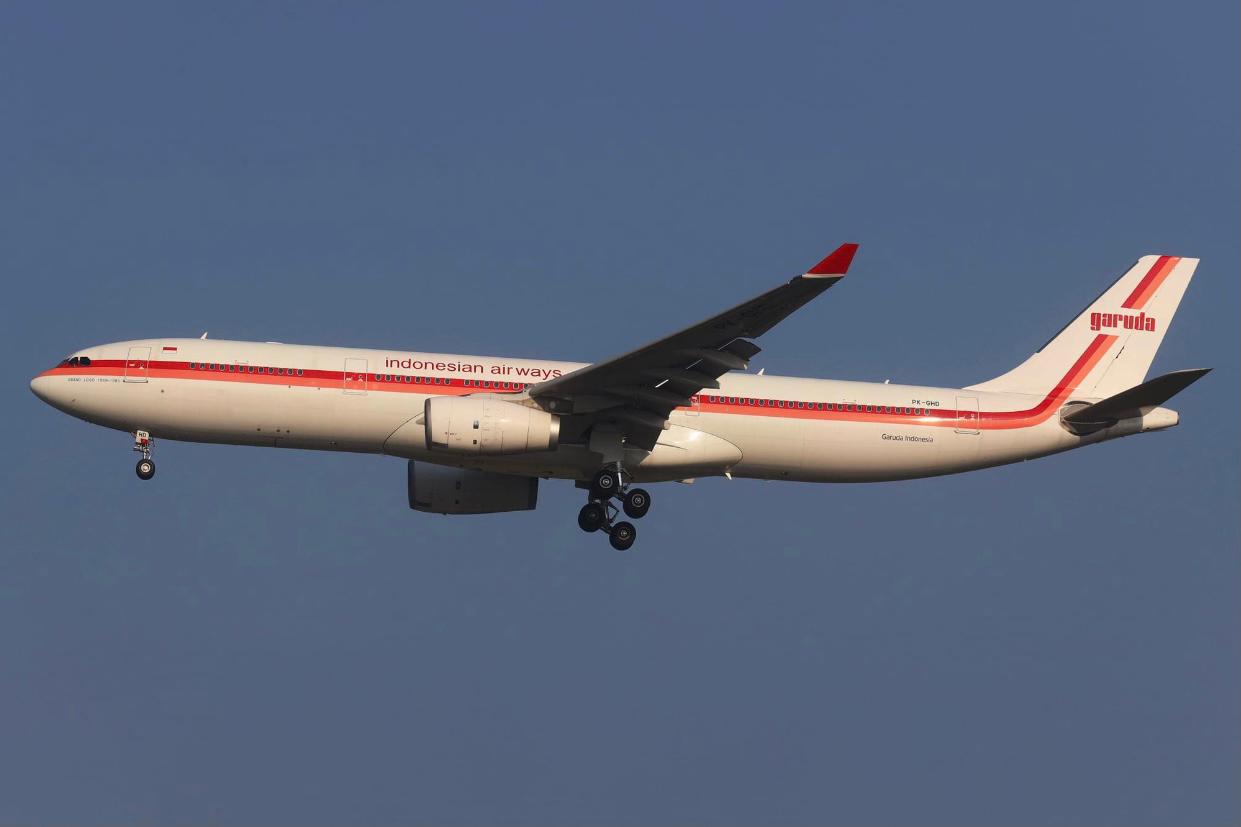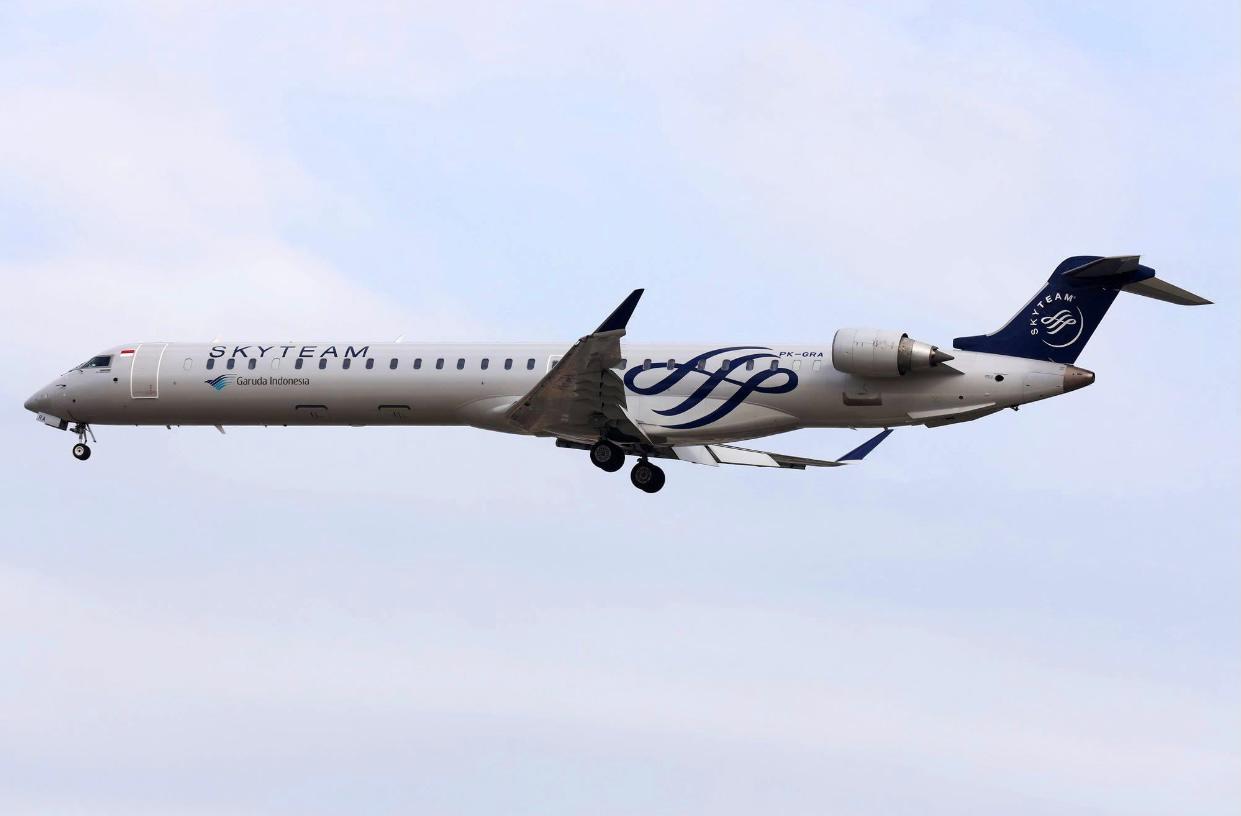
A Garuda Airbus A330-300 in retro livery. Pic / KC Sim
“Indonesia adalah negeri budak. Budak diantara bangsa dan budak bagi bangsa-bangsa lain.”
- Pramoedya Ananta Toer, Indonesian writer
Has any Indonesian airline CEO read Pramoedya’s works?
Loosely translated, the legendary Indonesian author was lamenting his country’s immature mindset in its early days, a child amongst its own people and a child in the eyes of the world.
Few countries in the world can match Indonesia in terms of diversity of culture, race and geography.
It is estimated some 300 different languages are spoken by the various ethnic groups spread across the vast archipelago of 17,000-plus islands, although the primary national and official language is Bahasa Indonesia.
The economy is chugging along, notwithstanding the current pandemic, with the central bank (Bank Indonesia) expecting a growth of 4.6% in 2021, a spectacular recovery from the negative 2.1% posted in 2020.
Foreign direct investments (FDI) rose 14% in 1Q 2021 or USD7.72 billion, from the previous quarter.
The plight of its airlines, unfortunately, is less than savoury, perennially under-performing (in terms of profit and safety) other companies within the economy.
Take flag carrier Garuda Indonesia, for example.
On 19 May, Garuda’s CEO announced a voluntary separation scheme for the company’s workers as the airline battles to stay solvent. He revealed the small matter of Garuda having accumulated debts of IDR70 trillion (USD5 billion).
Garuda has a negative cashflow of USD100 million a month and hopes to cut its debt size to USD1 billion, according to Badan Usaha Milik Negara (BUMN), the state-owned enterprise ministry that oversees the company.
The national airline, noted president director Irfan Setiaputra, is left with two routes: either it restructures or go to court (seeking shelter a la Chapter 11 in the US).
Another possbility – obtaining a government bailout – has been ruled out by the finance ministry.
This is where it gets really complicated.
Any form of restructuring will have to get a buy-in from over 20 lessors who are owed money since early 2020. Several of them, including Aercap, has taken Garuda to court.
Meanwhile European planemaker Airbus has recently completed constructing three A330neos for Garuda, part of an order for 13. The aircraft are currently sitting in Toulouse.
Garuda has no plans to take delivery of these planes.
And then there’s the small matter of a 25% stake in Garuda held by the billionaire Chairul Tanjung.
Of the airline’s 142 jets, 90% are leased from among others:
Avolon (A333s, B738s, A320s, A330neos), DAE Capital (A330 & B738s), ICBC (B738, B773s, A320s), NAC (ATR72-600s, CRJ1000ERs) and Pembroke (B738s).
Many of these planes are currently parked.
All of the lessors have not been paid their rentals since early 2020.
The other lessors owed money include:
ACG, Aercap, Airborne Capital, Aircastle, ALAFCO, ALC, Altavair Airfinance, AVAP, Aviator Capital, BBAM, BOCA, Bocomm Leasing, CALC, Carlyle Aviation Partners, Castlelake, CCB Financial, CDB Aviation, Chishima Real Estate, CMIG Aviation, Gecas, Goshawk Aviation, Jackson Square, Marx Aviation, Mitsui Bussan, ORIX and SMBC.
In February this year Garuda claimed – via Erick Thohir, the BUMN minister – it terminated the leases of 12 CRJ1000ERs from NAC (Nordic Aviation Capital) because there were allegedly elements of corruption in its acquisition and secondly, due to force majeure brought by the virus.
NAC released a statement stressing it was not under any probe linked to sale of the aircraft and that no termination letter had been received from Garuda.
In any case an airline cannot terminate a lease without the lessor’s consent unless it has been agreed in the contract before-hand.
Force Majeure or not?
On 13 April 2020 Indonesia’s government issued a presidential decree No.12 of 2020 which determined the virus as a “national disaster.” However, this does not automatically qualify Covid-19 as a force majeure.
Under contract law force majeure is a provision that makes the performance of a contract impossible and absolves the party from non-performance of contractual obligations caused by circumstances or events out of the parties’ control.
Force majeure is not a statutory concept and is typically negotiated and included, and agreed upon by both parties prior to entering into a contract.
None of Garuda’s aircraft leases had incorporated a force majeure clause, making it very difficult for Covid-19 to be classified as a force majeure event, never mind if it’s been categorised a natural disaster.
Unable to meet its obligations, Garuda is exploring various ways to salvage its business and avoid the liquidity crunch from forcing an outright collapse of the company.
One of these is the Doctrine of Frustration.
According to legal eagles, the contract becomes “frustrated” when an event occurs which has rendered it impossible or unlawful to perform the contractual obligations.
But Garuda would need to convince and satisfy the court that Covid-19 is radically different from what was undertaken by the contract and that it would be unjust to enforce the original promise or contractual obligation.
Nevertheless, a restructuring expert in Singapore warned: “Garuda cannot suspend its contractual obligations just because its obligation has become more onerous due to a change in circumstances.”
To be clear, Garuda was already having trouble servicing its monthly lease obligations well before the pandemic.
The airline ultimately may seek to pursue suspension of debt payment obligation, known in Indonesia as Penundaan Kewajiban Pembayaran Utang or PKPU.
Once a PKPU application is granted, there is a maximum temporary period of 45 days which can be extended to permanency that lasts for 270 days from signing.
During this period Garuda and its creditors / lessors can negotiate a restructuring plan, the success of which determines whether the flag carrier goes into bankruptcy.

Plagued by allegations of wrong-doing… Garuda’s CRJ1000ER. Pic / KC Sim
Will Jakarta keep Garuda alive?
It will definitely try.
Herein lies the crux of the problem with perennially loss-making airlines in Southeast Asia: many are run by emotions than by logic.
Many state-owned or legacy carriers facing financial crises are conveniently attributing their woes to the virus; they should neither be considered for restructuring nor privatized.
Putting them to sleep is a far better solution.
Most flag carriers carry political and other legacies that are intertwined with moral obligations of having to retain staff (however incompetent they are) and pacify clients and citizens ingrained with misguided pride.
The irony is, despite its finances now in tatters Garuda is in the midst of selecting a foreign adviser – at a cost that will run into millions – to help it navigate a way out of this rut.
One of the short-listed candidates is a renowned management consultant who once advised a European national airline, nicknamed the “flying bank.”
That airline failed spectacularly in 2001.
Restructuring advisers take the view that everything can be renegotiated to help an airline survive. In management consulting parlance a moribund airline facing a pack of livid lessors is nothing but a “win-win” position.
The airline business is a zero-sum game.
Garuda’s woes are complicated by having the influential businessman Chairul Tanjung as a 25% shareholder.
He is likely going to make restructuring a tad tougher than it already is because, according to his representative Peter Gontha (who happens to be Garuda’s commissioner), CT (as he is affectionately known) has accumulated USD770 million in losses since becoming a stake holder a decade ago.
Who will pacify and reimburse CT then?
Not Sri Mulyani, the feisty finance minister who is averse to bailing out the carrier.
In mid-2020 Mulyani agreed to disburse IDR8.5 trillion (USD550 million) to Garuda as part of working capital. Of that, IDR1 trillion has been funneled to the airline. She has alluded that the flag carrier will not get a penny more.
The finance ministry had also agreed to bear the cost of the voluntary separation scheme and early retirements for Garuda staff announced by its CEO on 19 May.
Restructurings by definition will need new money.
How and where will Garuda get a fresh injection of funds in order to restructure?
It would be almost impossible to resolve the airline’s debt and liabilities if the sovereign does not commit to the carrier’s reset.
Recall how Malaysia Airlines quickly sorted its debt and lease issues when Khazanah Nasional, the sovereign wealth fund, declared it would pump in MYR3.6 billion (USD870 million) into the national airline.
Unlike Malaysia or Singapore, Indonesia does not have a SWF.
It would therefore be best for Garuda to consider all its options, including liquidation.
The amount of money needed (easily in the billions) to rescue Garuda could be better used to overhaul the aviation industry in the country.
Restructuring the mythical bird is too complex, too risky and too costly.
Liquidation would give Indonesia a fresh start. And there is also the possibility of Citilink, the domestic subsidiary, replacing Garuda as the new national carrier.
